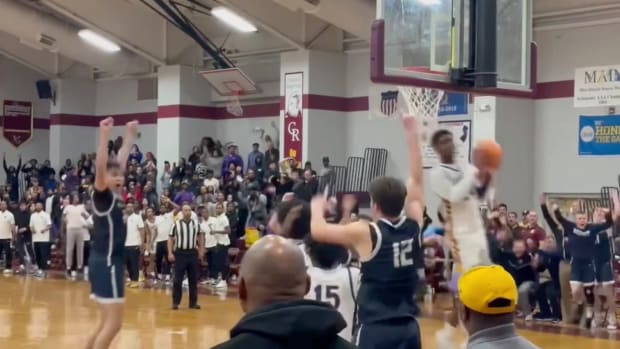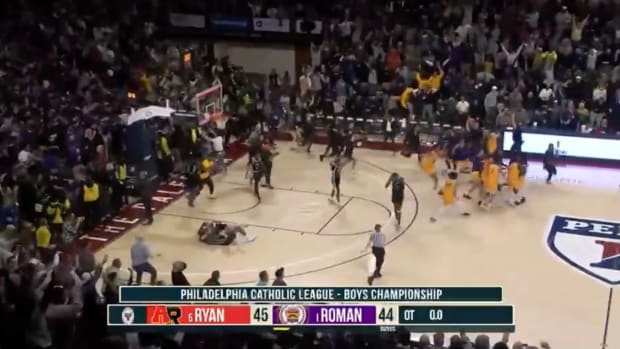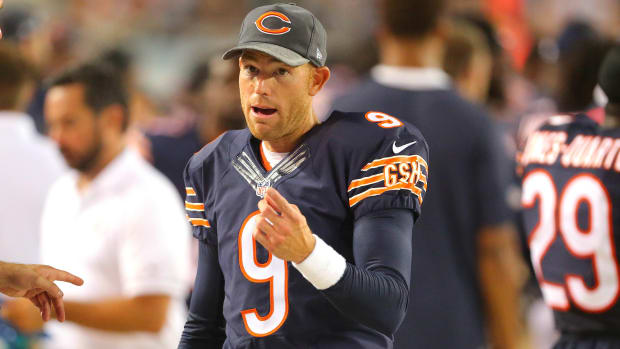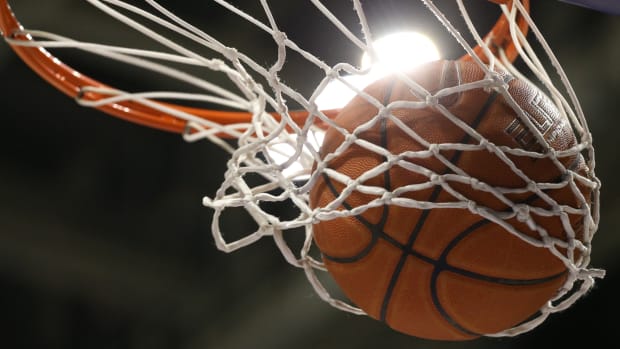Bobby Witt Jr. Wins Gatorade's 2019 National Male Athlete of the Year
The temperature is pushing 105° in Surprise, Ariz., on the afternoon of July 3 as the lanky shortstop fields grounder after grounder off his manager’s bat. The 19-year-old is fluid, his motions routine without being mechanical. He’s as sharp as the reddish mountains on the horizon behind him are fuzzy, distorted by the heat shimmer. Tonight, Bobby Witt Jr. will play his first game at shortstop for the Kansas City Royals’ rookie-level Arizona League affiliate, in front of a crowd of fewer than 10 (two of whom are his parents, Bobby Sr. and Laurie). Few are crazy enough to bake in this weather, even for a chance to see the ballyhooed No. 2 pick in June’s MLB draft.
Witt is still getting used to that designation, one of many he’s added to his résumé over his dizzying past six weeks. On May 30 he graduated high school, with a 4.0 weighted GPA. Four days later the Royals called the righthanded hitter’s name as he sat on a couch at his parents’ house in Colleyville, Texas. Five days after that he became a state champion, and four days after that, he became an official employee of the Royals, receiving a $7,789,900 signing bonus which is the third largest in draft history (after Adley Rutschman, the catcher picked before Witt by the Orioles, and Gerrit Cole, the pitcher selected No. 1 overall by Pittsburgh in 2011.) And there would be one more honor: On July 9, Witt was named the Gatorade Male High School Athlete of the Year.
After that, though, it’s back to rookie league. There will be a million ground balls to field and just as many swings to execute, one eye on the majors and two feet in the desert northwest of Phoenix.
In 2000, Bobby Witt was on track to be the father of cheerleaders, not the father of a future big leaguer. He and Laurie had three daughters between the ages of five and 10. The pitcher, who had been the third-overall pick in the 1985 major league draft, was 35, watching his career wind down, when he found out Laurie was pregnant with the boy who would become Junior.
The younger Witt has no memory of his father’s career—Bobby Sr., who went 142–157 with a 4.83 ERA in 16 big league seasons, made his final appearance in 2001—and felt no pressure, he says, to follow in his old man’s footsteps. But he can’t remember a time when he didn’t aspire to play baseball professionally. At five, Witt began playing organized T-ball. His father coached alongside his old Rangers teammate Rusty Greer. As time passed, and the younger Witt developed a preference for hitting over pitching, Greer took on a larger role in his instruction. As a player, Greer was known for his plate discipline, but he taught Witt to swing away, figuring contact should come first, then mechanics.
Witt’s eventual high school coach, Alan McDougal, ran many of the baseball camps in the area. He recalls the boy showing up in a full uniform, from cap to cleats, a tiny major leaguer beside his peers in jeans and beat-up sneakers.
Most years Witt’s birthday parties were baseball-themed. Sometimes the central activity was Wiffle ball, and the little boy went to his mother with an odd request: Could she invite a bunch of his older sister Shaley’s friends, too? The next-eldest Witt child was six grades ahead of her brother, and her friends were athletic. “They were good,” Laurie says, “and he wanted to play with the big kids.”
In 2010, James Russell, who is now married to the eldest Witt daughter, Nikki, debuted as a pitcher for the Cubs, and the family traveled to Wrigley Field for a series. Young Bobby shagged balls in the outfield during batting practice. Then his middle sister, Kianna, began dating her now-husband Zach Neal, a pitcher at the University of Oklahoma, where she was a cheerleader. Neal was drafted by the Marlins in 2010, and three years later, Shaley’s boyfriend, Cody Thomas, was picked out of Colleyville Heritage by the Yankees in the 30th round. He elected to attend Oklahoma instead and is now playing in Tulsa for the Dodgers’ Double A affiliate.
More than a decade after the elder Bobby joked to his daughters that they should stay away from ballplayers, Bobby Jr. is the fourth child in the family to flout that advice; his girlfriend, Maggie Black, is a rising sophomore at Northwestern State (La.) University—where she plays shortstop on the Demons’ softball team. “She’ll throw me BP, and I’ll flip her soft-toss, too,” Witt says. “Her BP is pretty good. It’s nice to have that; if my dad ever can’t throw, she’s there.”
The sons of major leaguers have dominated the top-prospect lists for the last several years, and Witt will likely keep the run going. Bobby Sr. hasn’t coached any of Junior’s teams since his son was 12, but over the past seven years he has thrown thousands of batting practices. Laurie contributes videography; on her worn-out iPhone she has filmed more than 4,000 in-game swings, each an individual video file. She’s long overdue for an upgrade but worries she’ll lose every shot she has captured. Those videos represent hundreds of tiny sacrifices; while focusing so intently on each swing, Laurie often misses her son’s biggest hits because her camera remains trained on his follow-through.
Over the years Junior and Senior have tweaked and built his swing thanks to those iPhone snippets and DVRed MLB games. Bobby Jr. will see something he likes and experiment, editing as he goes along. In Prince Fielder’s heyday, Witt added a toe-tap. Lately he’s been modeling his stroke more on Nolan Arenado’s. Bobby Sr. says he thinks the tinkering will serve his 6' 1'', 180-pound son well in Arizona and beyond.
This season Witt’s Colleyville Heritage Panthers won their first state championship, defeating Georgetown 14–2 in the University Interscholastic League Class 5A title game. On the season the shortstop batted .482 with 15 home runs, nine triples, 14 doubles, 19 steals, 65 runs scored and 55 RBIs in 42 games. In the field Witt made exactly one error, and he also appeared occasionally at closer for the Panthers, saving five games and striking out 23 in 11 1⁄3 innings.
Witt has already hit home runs in three major league parks. He smacked one out of Wrigley during the Under Armour All‑American Game last year. He also won the High School Home Run Derby at Nationals Park, hitting eight home runs in 76 seconds. This spring, in a game against Burleson at Globe Life Park in Arlington, he smacked one en route to a playoff victory. On top of that, he was part of Team USA in the 2018 COPABE U-18 Pan-American Championship last November and December in Miami and Panama. The team went 9–0, and Witt batted .576 and slugged 1.121 with three doubles, three triples and three home runs.
That trip happened to fall over national signing day, and Witt was more than 1,000 miles from his teammates as they inked their letters of intent. They stood in a gym, sporting caps and T-shirts bearing their future teams’ names as parents snapped photos. Witt, who’d committed to Oklahoma, sat in his seat on a bus, so early in the morning it was still dark. He touched fingertip to phone screen, doing the whole thing on DocuSign. For a commemorative photo, he held up a fake letter, typed on a sheet of white paper.
Witt was a desired prospect, but even then he couldn’t have imagined the hoopla to come. In May, MLB.com surveyed veteran scouts, coming to the conclusion that Witt was the second-best draft prospect at shortstop since 1987, behind only Alex Rodriguez. That assessment came after Witt had transformed, his coach says, from a good fielder into a phenomenal one.
A year ago McDougal didn’t know if his star would stick at shortstop. For all his arm strength, he occasionally flubbed routine plays. Come senior year, though, he was flawless, a five-tool player who, says McDougal, “looks like a big leaguer but would never big-league anyone.”
In the championship game, Witt had what was for him a pedestrian game—a hit and a walk. Still, reporters swarmed him afterward, and when they did, Witt pulled Joey Koetting, the third baseman who’d gone 2 for 2, scoring three runs and driving in three, into the media throng. Koetting was the only Panthers starter without a D-I offer, and it was his final high school baseball game. All interviews with the kid about to make more than $7 million would also include the kid about to face freshman orientation.
Earlier in the playoffs, McDougal was standing near the batting cages at Dallas Baptist University, talking to scouts. His players began to trickle out of the cages, and McDougal noticed one carrying a bat, a tee, bags of balls and helmets. Everyone else was empty-handed. The packhorse was Witt—the same kid who was spotted after his team’s state semifinal win in June picking up trash in the dugout. No one who knows him registers any surprise. McDougal, who sometimes has to censor his players’ desired batting-practice songs, recalls three years ago, when Witt was selected to be just the fourth freshman on varsity in the coach’s 14 years at Colleyville Heritage. The kid had asked for Tim McGraw’s “Humble and Kind.”
Those traits should serve him well in Arizona and at every other stop on his road to the majors. There are buses instead of planes, empty bleachers instead of packed stadiums. But for number 17—a tribute to his favorite players, Dustin Pedroia (number 15) and Derek Jeter (number 2)—those differences are immaterial. Witt knows what it feels like to clobber a ball into the stands in a big league park, and he knows there’s no better feeling.




